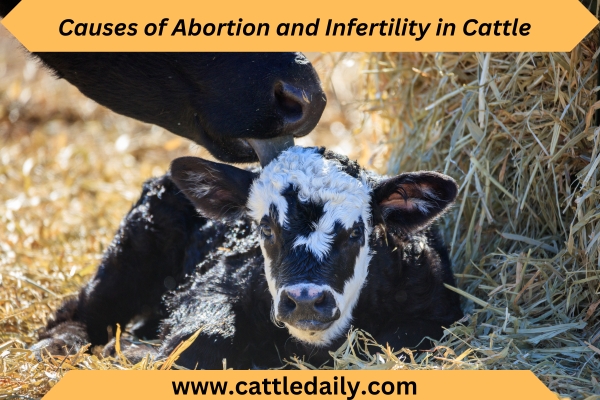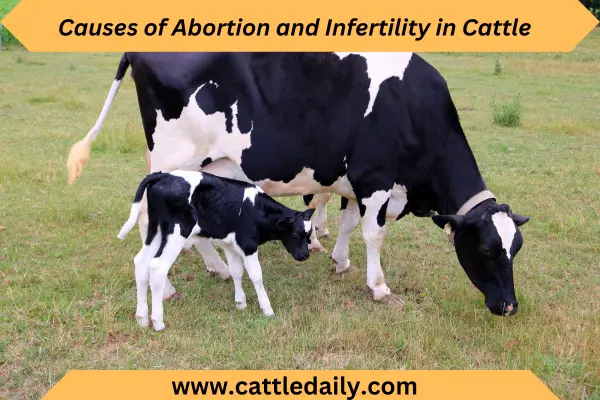Causes of Abortion and Infertility in Cattle
Abortion and infertility are major problems affecting the productivity and profitability of cattle operations worldwide. Understanding the potential causes of these reproductive issues is key to preventing and managing them effectively.
In this article, we will talk and explores the main factors that can lead to abortion and infertility in cattle herds.
What is Abortion in Cattle?
Abortion refers to the premature expulsion of the fetus from the uterus before it is viable, which generally occurs before 260 days of gestation in cattle. The three stages of gestation in cows are:
- Early embryonic death: Occurs before 42 days of pregnancy
- Mid-term abortion: Between 42-260 days of gestation
- Late-term abortion: After 260 days when the calf is viable
An abortion rate of over 5% is considered high and requires investigation into potential causes.
What Causes Abortion in Cattle?
There are several potential causes of abortion in cows which can be broadly categorized into infectious causes, nutritional deficiencies, toxins, and other factors.
Infectious Causes
Bacterial infections:
The most common bacterial causes of abortion in cattle include Campylobacter, Salmonella, Listeria, Leptospira, and Brucella species. These bacteria can cross the placental barrier and infect the fetus, leading to fetal death and abortion.
Brucella abortus is the most common cause of contagious abortion in cattle. These gram-negative bacteria localize in the pregnant uterus, cotyledons, or mammary glands. The bacteria multiply rapidly and spread via the blood to infect the fetus.
Viral infections:
Major viral causes of abortion in cattle include Bovine Viral Diarrhea (BVD), Infectious Bovine Rhinotracheitis (IBR) caused by bovine herpesvirus-1, and Bluetongue caused by the orbivirus.
BVD can cross the placenta and infect the fetus, especially during the first trimester leading to fetal death. IBR virus infects the uterus and placenta causing necrosis and abortion. Bluetongue virus also damages the placenta triggering abortion.
Protozoal infections:
Neosporosis caused by Neospora caninum, Tritrichomoniasis caused by Tritrichomonas foetus and Toxoplasmosis caused by Toxoplasma gondii are protozoal diseases associated with abortion in cattle. Neospora caninum is a major cause of abortion worldwide.
The parasite replicates in the placenta causing necrosis and inflammatory lesions that impair maternal-fetal exchange leading to abortion. Toxoplasma gondii infects the fetal tissues causing necrotic placentitis and fetal loss.
Fungal infections:
Aspergillus species and Mucor species are opportunistic fungal agents that can occasionally cause sporadic abortions in cattle. The fungal hyphae colonize the placenta and spread to the fetus resulting in necrosis and eventually abortion. Mycotic placentitis is the hallmark lesion.
Nutritional Deficiencies
Deficiencies of vitamins A, D, and E can lead to weak calves and pregnancy loss. Vitamin A deficiency causes degeneration of epithelial tissues of the placenta and fetus.
Vitamin D deficiency impairs calcium absorption, bone development, and maturation of the fetus. Vitamin E deficiency is associated with degenerative changes in muscles, edema, and immature calves.
Mineral deficiencies like selenium, copper, and zinc can negatively impact fertility and cause late-term abortions in cows. Selenium deficiency is linked with retained placenta, weak calves, and abortion. Copper deficiency causes degeneration of the fetal membranes leading to premature placental separation.
Toxins
Ingestion of moldy feeds like hay or silage containing estrogenic mycotoxins like zearalenone can disrupt the hormones required to maintain pregnancy resulting in abortion.
Poisonous plants like Lupine and Ponderosa pine needles contain alkaloids that are teratogenic causing fetal malformations and abortion. Aflatoxins produced by Aspergillus fungi in contaminated feed negatively affects fetal development and viability leading to calf loss.
Other Factors
Heat stress can impair uterine blood flow and placental function leading to lowered oxygen and nutrition to the fetus, resulting in pregnancy loss.
Trauma from inappropriate handling, improper restraint or transport stress can trigger abortion by elevating cortisol levels.
Accidental vaccination of pregnant cows during early gestation with live vaccines like IBR or BVD can infect the fetus and cause abortion.
Genetic issues like chromosomal abnormalities and genetic mutations in the fetus are associated with early embryonic death and abortion.

What is Infertility in Cattle?
Infertility refers to the inability of a cow to conceive and maintain a pregnancy to term leading to no calf being born. It indicates a failure to reproduce.
Subfertility is when cows have issues getting pregnant resulting in low conception rates, delayed conceptions of over 90 days, or irregular calving patterns with more than 365 days between calves.
Causes of Infertility in Cattle
1. Nutritional deficiencies of energy, protein, vitamins and minerals can negatively impact fertility by disrupting the reproductive cycle. Deficiencies of phosphorus, copper, zinc and selenium are specifically associated with infertility in cows.
2. Infections like Brucellosis, Vibriosis, Trichomoniasis cause inflammation and scarring of the reproductive tract damaging the uterus, fallopian tubes and ovaries resulting in infertility.
3. Ovarian cysts caused by hormonal imbalances disrupt the estrous cycle preventing ovulation, conception and pregnancy. The cysts persist disrupting the cycles.
4. Physical trauma to the reproductive organs like dystocia, uterine/vaginal prolapses, and assisted calving can damage the cervix, uterus, ovaries and cause infertility.
5. Management issues like poor estrus detection, inadequate bull to cow ratio, poor semen quality in bulls due to overuse or disease can reduce conception rates.
6. Genetics like chromosomal abnormalities, inbreeding resulting in lethal recessive gene pairs can cause infertility due to fetal loss.
Preventing Abortion and Infertility
1. Maintain excellent nutrition and minimize stressors like heat, transport to optimize fertility. Meet protein, energy, mineral and vitamin requirements.
2. Vaccinate properly against reproductive and abortion causing diseases like BVD, IBR, Leptospirosis, Vibriosis.
3. Control parasites and pests like flies. Test and treat any reproductive infections.
4. Ensure proper bull management with BSE exams, resting periods. Follow planned breeding protocols.
5. Cull cows with recurrent abortion or infertility issues. Do not rebreed perpetually.
6. Keep meticulous herd records to identify patterns and monitor herd performance.
7. Manage your cattle carefully to avoid overgrazing, overcrowding, and improper handling which can cause stress and trauma.
8. Reduce stress on your cattle. Heat, social stress, transport stress, weaning can impair fertility.
9. Provide shade and unlimited cool, clean water for your cattle in hot weather to prevent heat stress.
10. Monitor your cattle closely for signs of illness, injury, dystocia to allow early intervention and prevent infertility.
Conclusion:
Abortion and infertility in cattle have multifaceted causes including infections, toxins, stress, trauma, nutritional deficiencies and genetics. A combination of excellent herd management, preventative health programs and prompt diagnosis is key to minimizing reproductive loss. Learn here more about animal health issues and trements tips and care.


